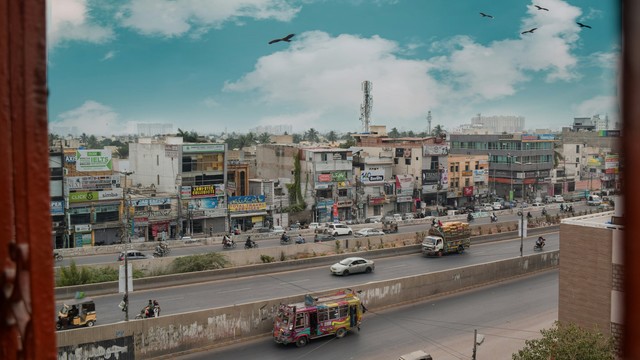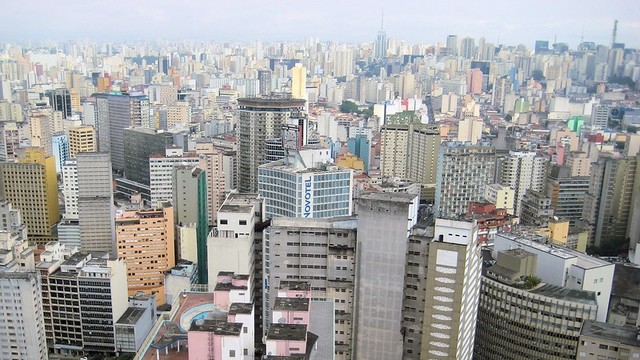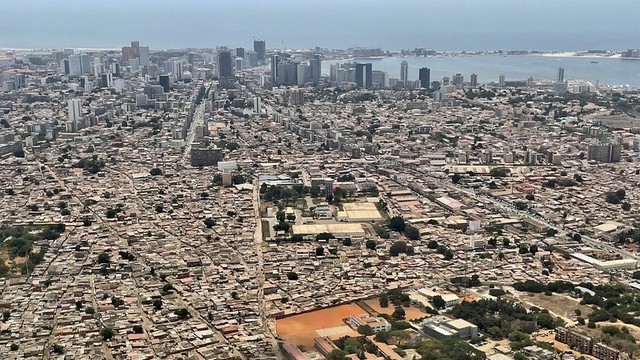The changing status of Karachi’s women
Our guest blogger examines the radical transformation of population, neighbourhoods and public spaces in Karachi over the last seven decades. The social change this has brought is most pronounced among the city’s women. He looks at the impact of the transformation on their lives, livelihoods and opportunities.


Three women at Port Grand, an entertainment park in Karachi (Photo: Komail Naqv via Flickr, CC BY-NC-ND 2.0)
In a traditionally segregated society, a change in the status of women alters every aspect of that society – from local governance to trade and commerce, politics and gender relations. Many of the traditional roles which women are expected to play, both in society and at home, are increasingly questioned and challenged.
The Karachi that was
Forty years ago, society in Karachi was very different. People of the same caste or tribe, irrespective of their income, lived together within extended families.
This was so for settlements that preceded partition and for the Muhajir households. Even though they were ethnically different, they often shared a common gender- and family-related culture. Marriages were arranged by the elders, usually within the extended family. Young men could not choose their professions but had to conform to what their fathers decided.
In keeping with the mainstream interpretation of the Hadith and Islamic scholars’ preachings, women could not leave the house alone or meet men. This meant that most had never visited places outside Karachi. Indeed, many had never been out of their own neighbourhood.
However, a new class emerged – the product of pre-partition colonial education, and post-partition convent-educated young men and women. Its members were responsible for the growth of bars and nightclubs, numerous bookshops and a liberal society that tolerated diversity and dissent. This class ruled the city, as the populist politics of votes and constituencies that challenged its power, had not yet emerged.
But the parents of the 1990s grew up in general Zia-ul-Haq’s Pakistan, governed by a reactionary political interpretation of Islam. Every attempt was made to regain control of society – and fossilise it.
In schools the teaching of global history and geography was discontinued. Classical music and dancing was banned on radio and television, as was the broadcasting of progressive Pakistani poets and thinkers. There were attempts to introduce the chopping off of hands for theft, and stoning for ‘adultery’.
A society in transition
The beginning of the demise of the extended family was influenced by remittances from workers who were part of a mass migration to the Gulf states during the 1970s, and conflicts over their use and ownership. Due to a shortage of housing, settlements became denser, and multi-ethnic.
Clan-based marriages slowly came to be replaced by those between neighbouring families, irrespective of caste, and women in the new nuclear families demanded their own separate kitchens.
The education of women became relatively easier. According to census figures, the number of women in Karachi who were literate grew from just under 49% in 1981, to 71% by 2017. This trend was encouraged by the need for writing and reading skills, even in low-grade jobs. Education became an important factor in choosing a spouse, for both men and women.
This change was accompanied by an increase in women’s employment in the industrial sector, which led to interaction between the sexes at work and when commuting. Many women wearing the hijab at public sector universities removed it for evening functions. This period also saw the emergence of private sector universities, with a heavy Western orientation in lifestyles and behaviour.
A new generation emerges
Parents of today are the product of a very different culture, moulded by globalisation, social media, and state attempts to balance itself between traditional values and emerging global trends.
Media continues to play a key role. Television dramas reinforce the stereotypical world of a woman, heavily featuring ‘in-laws’ and love triangles. Although previously taboo subjects such as ‘illicit’ love affairs and children born out of wedlock have been added to many dramas, traditional values eventually emerge victorious.
In contrast, on YouTube, celebrities openly discuss their relationships (marital or otherwise), and health and body image issues. All this is viewed and discussed by the younger generation.
Popular shows, such as Geo’s Hasna Mana Hai, have the host questioning the audience about their personal lives. Netflix and YouTube have made non-marital love stories, platonic relationships between men and women, and gender identities that fall outside of mainstream consciousness, acceptable to a large section of the population – further antagonising conservatives.
Social media platforms have also helped enormously in developing and promoting local musicians and artists. Post-Zia era parents have seen the emergence of the Pakistan women’s cricket team, women mountaineers, female bureaucrats, and more women in the police force – as well as a women’s hockey team whose kit was heavily criticised by conservatives because it exposed their knees. However, the uniform has stayed.
Results of a survey of what women want from a park showed top priorities were space to play cricket, gym machines, a dedicated yoga area and an open-air library.
The concept of ‘girlfriend/boyfriend’ has also been accepted by the younger generation, as has the concept of ‘dating’, sometimes using the increasingly popular dating apps – despite attempts by the Pakistani state and religious right-wing to ban them.
Breaking the shackles
Twenty years ago, it was not possible for single girls or unmarried couples to rent independent accommodation. This is changing. Many university-going and formally employed women are choosing to live in hostels or shared accommodation. Young migrant workers who earlier lived with senior members of their clan, now rent together.
More women have paid work, which gives them greater autonomy to make decisions about their lives, including being able to move out of their parental home before they marry, or if married to separate from their husbands.
Mobility is a concern for women, so motorbikes are emerging as an important means of transport. Pink Riders Pakistan provides motorcycle training for women across the country and has trained 9,500 riders in the last five years. More women are driving motor vehicles.
Many women now use gyms – including mixed-gender ones. Personal grooming has become important, which explains the proliferation of beauty parlours, even in low-income settlements
This challenging of societal attitudes is supported by social media groups, including many all-women Facebook groups, with tens of thousands of members.
Reality kicks in
Many things written here are class-specific but there is a constant exchange of ideas and lifestyle aspirations between the classes. These include better education for their children, a healthy physical environment, and prospects of upward mobility.
But these aspirations conflict with the lived reality. Many still have no possibility of acquiring a house, education remains unaffordable, many lack access to transport and culture, and cannot afford expensive entertainment, health or recreation.
Since these cannot be fulfilled, an increasing number of young people want to leave Pakistan. This is no basis for what is essential for peace, stability and prosperity – a sympathetic embrace by the state of the aspirations of the younger generation.
With thanks to Dhuha Alvi and Khadija Imran, researchers in Arif Hasan’s office, for their valuable contributions to this blog.



